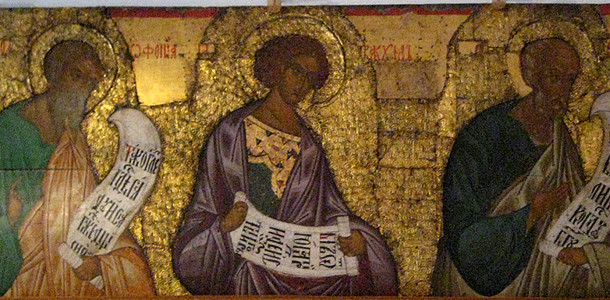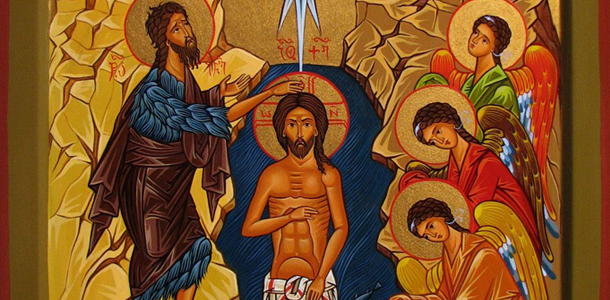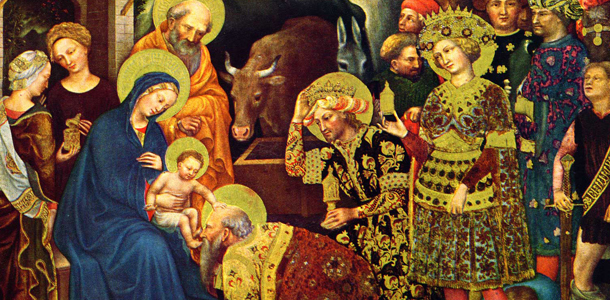The Cost of Authentic Prophecy
January 29, 2013 by Leave a Comment

Fourth Sunday in Ordinary Time – February 3, 2013
The readings for this Sunday are: Jeremiah 1:4-5, 17-19; 1 Corinthians 12:31-13:13 or 13:4-13; and Luke 4:21-30
Today’s Old Testament reading from Jeremiah (1:4-5, 17-19) and Gospel passage from Luke (4:21-30) offer us an opportunity to reflect on the blessings, burdens and risks of authentic prophets in our Judeo-Christian tradition.
Among the Biblical prophets, we probably know Jeremiah best of all. The son of the priest Hilkiah, he was born in Anathoth — eight miles northeast of Jerusalem — and was called very early to carry out his prophetic mission, perhaps in 626, during the reign of Josiah (Jeremiah 22:16).
Jeremiah was so young that he begged the Lord to allow him to lead a normal life and to spare him the task of scourging the people of Israel and prophesying an invasion of foreigners “from the north” who would deport the Jews and destroy Solomon’s Temple.
Jeremiah saw the catastrophe of his people as an inevitable consequence of the guilt of an entire people who no longer remembered its history. The Hebrews, blindly counting on the Covenant guaranteed by the Lord, and on the Ark preserved in the Temple, felt that the Lord was with them, and as a result they could allow themselves any kind of sin!
Having pulled out from under the yoke of the Lord, Jeremiah told the chosen people that they would fall under the yoke of strangers. But the task assigned to him by God was not only destructive: “Look, today I have set you over the nations and kingdoms, to uproot and to knock down, to destroy and to overthrow, to build and to plant” (1:10). It was also to build and to plant, then. But first it was necessary to uproot so that true growth could occur.
Jeremiah prefigures Christ
Jeremiah has often been seen as a figure foreshadowing Christ. Not only does he speak in God’s name and predict the future, but his very life and ministry have prophetic overtones.
Just as Jesus would do after him, Jeremiah foretold the destruction of the Temple, wept over the future ruin of Jerusalem, condemned the conduct of the priests, was misunderstood by his countrymen, and was humiliated and sentenced to death. Yet the prophet’s condemnation of sin and prophecies of misfortune are always linked to a message of hope and the prospects for rebirth, for return from the Babylonian exile.
Christ, too, in order to affirm his victory over death, would first have to endure the cross on Calvary. The prophet Jeremiah’s very life prepares for the acceptance of the bitterness of the cross and the glory of the resurrection. We should not be surprised then, when Jesus asked his disciples what people were saying about him, they answered, “Some say You are John the Baptist, others the prophet Elijah, others Jeremiah.”
The madding crowd in Nazareth
Today’s Gospel story (Luke 4:21-30) is a continuation of Jesus’ great inaugural moment in the Nazareth that we read last Sunday. In the Nazareth synagogue, Jesus set forth his universal mission repeating the words of the prophet Isaiah (61:1-2).
Into this scene of hometown pride in Nazareth, Jesus brings confusion. A murmur of excitement rippled through the congregation. “Is not this Joseph’s son? Don’t we know this son of Nazareth?”
Yet Jesus knows that his townspeople want to possess him for themselves: “Do here in your own town what we have heard you did in Capernaum.” But he refuses to do so. “No prophet is accepted in his own native place.” Jesus resists the possessive attitude manifested by his people. Jesus refuses to place his extraordinary gifts at the service of his own people, putting strangers first.
The references to Elijah and Elisha (Luke 4:25-26) serve several purposes in this episode: They emphasize Luke’s portrait of Jesus as a prophet like Elijah and Elisha; they help to explain why the initial admiration of the people turns to rejection; and they provide the scriptural justification for the future Christian mission to the Gentiles.
The mood in the synagogue turned rather ugly. The crowd grew terribly envious of one of their own and tried to get rid of him (4:22-30). Jesus did not succeed in making himself heard and understood and he had to depart in haste — for his life (4:30). The rejection of Jesus in his own hometown hints at the greater rejection of him by Israel (Acts 13:46).
Reason for discontent
The people of Nazareth took offense at him and refused to listen to what Jesus had to say. They despised his preaching because he was from the working class; a carpenter, a mere layman and they despised him because of his family. Jesus could do no mighty works in their midst because they were closed and disbelieving toward him.
If people have come together to hate and to refuse to understand, then they will see no other point of view than their own and they will refuse to love and accept others. Does the story sound familiar to us? How many times have we found ourselves in similar situations?
The most severe critics are often people very familiar to us, members of our families, relatives, members of our communities, neighbors we rub shoulders with on a regular basis. The people of Nazareth refused to renounce their possessive attitude toward Jesus. When possessive love is obstructed it produces a violent reaction. This sort of reaction provokes many dramas of jealousy and passion. “Everyone in the synagogue was enraged (Luke 4:28-29) and they sought to kill him.” Refusal to open our heart can lead to such extremes.
Universal vision
Jesus was bitterly criticized because he demonstrated great openness of heart, particularly toward people on the fringes and borders of society. His openness caused rising opposition that led him to the cross.
In the Acts of the Apostles we read more than once that the success of St. Paul’s preaching to the gentiles provoked jealousy among some of the Jews, who opposed the Apostle and stirred up persecution against him (Acts 13:45; 17,5; 22,21-22). Also within the Christian community, we need only recall the situation in Corinth where similar possessive attitudes caused serious harm when many believers attached themselves jealously to one apostle or another; causing conflict and division in the community. Paul had to intervene forcefully (1 Corinthians 1:10-3:23).
Today’s Gospel shows how difficult it is for us to attain to a universal vision. When we are faced with someone like Jesus, someone with a generous heart, a wide vision and a great spirit, our reactions are very often filled with jealousy, selfishness, and meanness of spirit. His own people couldn’t recognize the holiness of Jesus, because they had never really accepted their own. They were suffering from a particular form of blindness.
They couldn’t honor Jesus’ relationship with God because they had never fully explored their own sense of belonging to the God. They couldn’t see the Messiah standing right beside them, because he looked too much like one of them. Until we see ourselves as people beloved of God, miracles will be scarce and the prophets and messengers who rise among us will struggle to be heard and accepted for whom they truly are.
Called to be prophets
Jesus was called to break boundaries and take God’s message of salvation to unexpected people and unexpected places. Obviously, pain and hostility must be endured before Jesus’ new age comes to glory.
Through our common baptism, each of us is called to be a prophet for the Kingdom of God. We will encounter many reactions from those to whom we are sent, not all of them positive. Like Jeremiah and Jesus, unswerving dedication bold courage, and deep, biblical hope must be our trademarks.
Today’s Gospel warns us to be on guard against certain attitudes that are incompatible with the example of Jesus: the human tendency to be possessive, and egoistic and small in mind and heart. We cannot forget that Jesus is the Savior of the world (John 4:42), and not of the village, town, city or nation!
Let us pray that Jesus not be amazed at our own unbelief, but rather rejoice in our small, daily acts of fidelity to him and our service to our sisters and brothers. May the Lord grant us magnanimous hearts so that we may look far beyond ourselves and recognize the goodness, greatness and beauty of other people, instead of being jealous of their gifts.
God’s power alone can save us from emptiness and poverty of spirit, from confusion and error, and from the fear of death and hopelessness. The gospel of salvation is still “Good News” for us today. How do we speak the Word of God with authority today? How do we share the “Good News” with others? How do we use our authority to further the Kingdom of God? How are our words, gestures, messages and lives prophetic today, in the Church and in the world?


